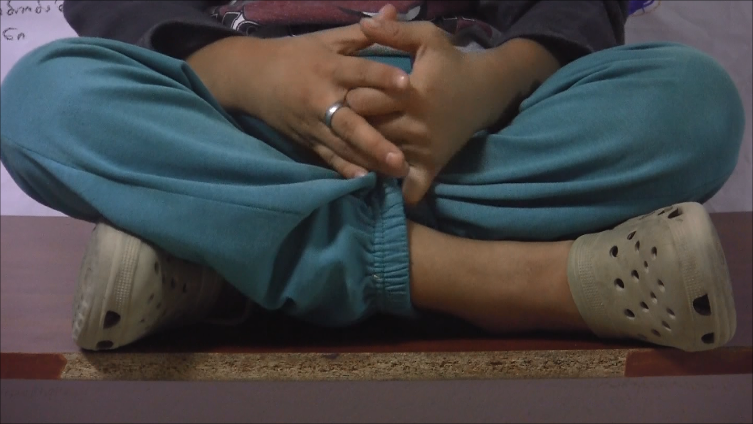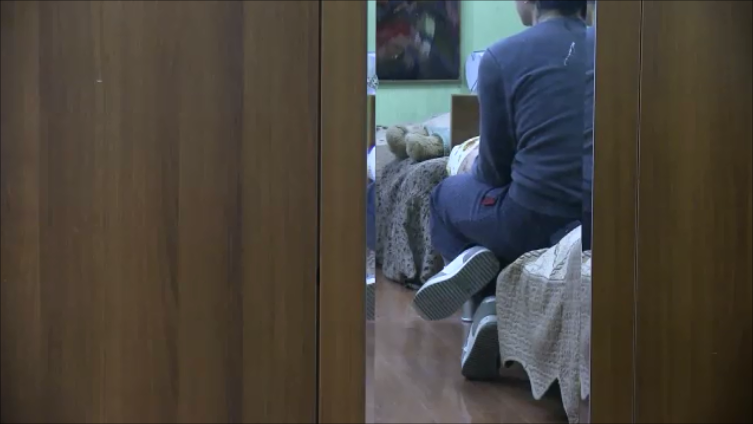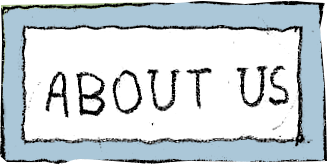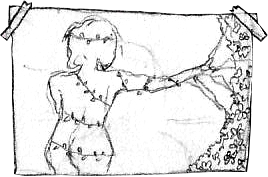Alternative Home
*names are changed due to the sensitivity of the topic 11-year old boy is sitting on the table, swinging his legs impatiently. Suddenly Sandro starts running across the room, constantly whispering something. He finds it hard to sit quietly for a while. Sandro has been living in Georgia since he was 3 years old. Aunt brought him to Tbilisi and forced to beg in the street together with his brother. If children collected less than 20 Lari, they would be punished. Father and aunt would beat them violently. When he could not take it anymore, he ran away from his family. His brother still stays at home, he still begs in the streets. Brothers have not seen each other for years. “You know how I love my brother? With all of my heart and soul. I want him to be well, to be with me and to wear nice clothes” - Sandro worries.

After spending some time in the street, the boy was taken to a Crisis Intervention Center. At that time the reform was remodeling the child care system and large institutions such as orphanages were transforming into smaller, more appropriate alternatives. New state policy aims to create a family environment for every child. The child care system is separated in two parts: Small Group Homes and Foster Families.
Different models of childcare system is well used in various countries. For example, in the USA there is Nurse-Family Partnership program - the visits are conducted in the client's home. Home visits involve highly trained professionals putting mothers and, ultimately, their children, in touch with resources and community services within the privacy, safety and comfort of their home base. Efficient home visitation programs that work with parents to become better caregivers can prevent child abuse, neglect and lessen the impact of trauma on a young brain. In Scotland they are using face-to-face approach to enable children to value themselves more and look to the future, to increase their capacity in addressing problematic situations and advocate for themselves. Shelter Children’s Services in Scotland helps children to look ahead and set goals, as well as focus on their skills, strengths, achievements and personal qualities.
When it comes to Georgia, the system is divided in three main parts: Crisis Intervention Centers, Small Group Homes and Foster Care. Small Group Home is a place for those underage children who can’t go back to biological families or their adoption is improbable. This institution is almost like an orphanage, but the atmosphere here is more like in families. Not more than 10 beneficiaries are provided with meals, clothing, health care, cultural-educational activities and etc.The same rules apply here as in families. Children should not be late or walk around late in the evenings. Also they have to keep contact with teachers during the day and tell them where they are, the same way one would inform his or her parents. Here child is being prepared for independent life outside the institution, as one can only stay in a Small Group House until he/she is 18 years old.
Another option of childcare politics is a Foster Family. Foster Family signs the agreement with the state and provides a child with a living in a family environment for a certain period of time. In this case, an underage child should be either an orphan or his/her parents should be deprived of their parental rights, gone missing, declared incapable. If the child is more than 10 years old, he/she is not taken to a foster family without his/her own will. Also brothers and sisters are not separated. Currently there are 1382 children in foster care and the number is growing. If a child lives in a foster family non-related to him/her, foster parents get about 450 GEL as a monthly allowance. The amount is higher if the child has special needs.The family is regularly checked by a social worker whose visits may increase if it’s necessary. Parents are obliged to take care of a child, but the official guardian is the Social Service Agency.
The Social Service Agency (SSA) has established the program for providing the shelter (Crisis Intervention Center) for children outside family care. Under this program, 3 mobile groups currently work in Tbilisi. Such groups consist of a social worker, a psychologist, a peer educator and a driver. The groups are usually searching for children street by street. They sometimes get a call from the police or citizens and get the information about the potential member of target group as well. If the child agrees, he or she is taken to one of the 3 shelters located in Tbilisi. All of these shelters are administered by the following non-governmental organizations: Caritas, World Vision and Child and Environment. These shelters provide both, daycare and night care services. They fulfill the basic needs of children such as food, hygiene, safety and health. Some of the children permanently live in the shelters while others come just for food. The child chooses herself or himself whether to stay or to go. Those who decide to stay are under the responsibility of the shelters.
One of these shelters has become a home for 11-year-old Sandro. For him it’s a place where he feels safe and loved, behaves under the rules of teachers, learns, plays and grows. This is the place where he found his first love in life. The girl lives in a small group house, but they often visit each other. Sandro may be transferred to a foster family outside Tbilisi where he would live with foster parents and brother. When a child is moved from the Crisis Intervention Center, he/she is prepared for big changes. Usually preparation period includes several consultations with the psychologist. In case of Sandro, he told us the story himself and seemed quite excited about the changes. Later, during the conversation, suddenly his attitude changed, as if he did not know what was waiting for him there and was afraid to leave the familiar place. However, as we found out, he had the information about the foster family and what kind of changes he will face after the transfer before. That’s when we got really interested in not only the preparation period for the transfer, but generally - how the psychologist works with children. She mainly gives the children advice about having a better future and what they need to do to achieve it: “Such consultations are held in a friendly atmosphere and with unofficial approach”. As the center’s psychologist Rusudan Shinjikashvili says, such kind of method works better when it comes to children and their behaviour, rather than therapeutic approach. She claims that because of the age and the lack of experience children get easily scared if you talk with them in an official manner and use unfamiliar terminology. “All of them have gone through some kind of trauma. Of course we talk about it, but only if they wish. Otherwise, I do not mention it.” - says Rusudan Shinjikashvili.16-year-old Tamuna is living in a small group house. She was raised by her uncle, aunt and father. At that time her mother could not provide her with the care that she needed. After her uncle’s death she started to think about living independently. “Everything came easily to me and I did not know how difficult it was for my parents to get money. When I had an argument with my father, it was beneficial for me. He told me to leave and that’s what I did”. Tamuna moved from one friend’s house to another for weeks, feeling ashamed to stay long at one place. She dropped education. Friends’ families knew she had a minor conflict with family members and would return back soon. She thought that it would be easy to get by and started to work as a waitress. However, the salary was so low that it was not enough for her. Later, by chance, in the park, she met a guy who told her about institutions such as Crisis Intervention Centers. “I liked the idea very much. But it took us an entire week to actually find a police car which could take me to the center.”
At first it was quite difficult, considering the fact that teachers and children did not really trust her. She had moments when she thought about leaving, but decided to stay anyway. She thinks that this would be better for her future life, because here she has an actual opportunity to learn and develop. She wants to be a designer and a tattoo artist. Drawing is something that helps her express herself. While talking, we noticed a paper, clipped on the wall above the table. “Atheism is a Greek word and it means “Without God”. Atheists do not believe in god” - says the text on the paper. She put it on the wall so that everybody could read it and she does not have to explain each time about her beliefs. She does not believe in god. “All of us, who live on earth are devils, because we do everything that is forbidden by the religion. I don’t think that god would forbid so many things, it’s just made up by people.” Instead of god, she strongly believes in reincarnation. Believes that in previous life she was an Italian transgender.

Her religious beliefs changed after her uncle’s death. Before that, Tamuna would wear long, wide dresses and go to church every sunday. She talks about her uncle as someone as dear as a father who would give her anything to have a full life. “If he was alive now and saw that I live in Crisis Intervention Center, does not matter how well I live, he would die again”. Tamuna says that she would not be here if her uncle had not died, but then she would not see all the trouble and would not learn from it. “I fell and got up many times. You know what, a person has hands, legs and brain to use them and not just sit and rot” - she explains.
She was recently transferred to a small group house based on her own will. Before she visited the place several times and meet the children who live there. Before the transfer, she talked with the psychologist (Rusudan Shinjikashvili) two times and she was ready to take next step. However, one of her new teachers thinks that she might not fully understand the scale of responsibility that she has to take in her new home. In other words, she might not be ready.
Small Group House is more organized and regulated than Crisis Intervention Center. Here children have less freedom and they have to obey the same rules as in every other family. This means that they cannot be late at home or cannot spend the night outside the house. Otherwise, they should leave and go back. In Crisis Intervention Center children have freedom to choose whether to stay or to go. One night they may spend in the shelter and another with a friend or even in the street.
A 15-year-old Mariko is sitting on a bed, holding a fluffy, white toy cat in her hands. She says it’s a present from boyfriend. She has been living in crisis intervention center for several months. She left home after having an argument with her mother. “My mother was having a lifestyle of a young girl, she would often go out to have fun or bring her friends at home. When I came back from home there was smoke, cigarettes and alcohol bottles everywhere. The music was playing loudly. I was sick of it” - she remembers. Mariko says she always asked her mother to grow up and remember that she had two daughters, but it was pointless. Her sister ran away even before her, on new year’s eve and she also lives in the center. Mariko often gives advices to her sister and explains that running away from the centre, missing school and hiding will bring no good. When the sisters argue, Mariko avoids fighting because she thinks that the age of contest has already passed.
Mariko loves jumping and climbing the trees. Sometimes she writes poems that generally use to seem very sad. She also has a diary which time by time is getting full with memories written before sleep, late night. “Dancing is everything for me. I can dance all the time and never stop!” - she says.
But Mariko chooses a different profession for future. She wants to become a journalist. She has been told that she talks very much and journalism is a good profession for her. “I want to study hard. Then I want to attend the university, to get a degree. Then get married and have twins. That’s gonna be my life” - she explains.
Each of these children's’ stories are unique and there are much more to hear. While the child care system is being modified, there are still children left who live in the streets.
Background
How many children are living outside of family care?
We don’t know the exact number.
There is no official statistics that represent the number of children who actually live on the streets or are registered in relevant institutions.
After the reform in childcare system, large institutions such as orphanages were transformed into smaller, more appropriate alternatives. If in 2011 the number of big institutions was 24, no single orphanage is left today. The turning process took about 5 years. For 2012 the number was decreased twice; for 2013 – 2014 there were 8 orphanages left in the country; in 2015 just 2 institutions were functioning and a year later none of them is available.
Children outside of family care could not disappear anywhere. They should have been transferred in other places. New politics aims to create a family environment for each child and today the system is separated in two parts: Small Group Homes and Foster Families which are financed by the government.
Small Group Home is a place for those underage children who can’t go back to biological families or their adoption is improbable. This institution is almost like an orphanage, but the atmosphere here is more like in families. Not more than 10 beneficiaries are provided with meals, clothing, healthcare, cultural-educational activities and etc. Throughout the whole period, social workers still make effort to return a child in a biological family. Annual budget for Small Group Homes is 2 283 000 GEL: 20 GEL for a day service for children with disabilities and 17 GEL for those without disabilities. Currently 399 children live in Small Group Homes on the whole territory of Georgia, but the number varies daily.
Another option of childcare politics is a Foster Family. Foster Family signs the agreement with the state and provides a child with a living in a family environment for a certain period of time. In this case, an underage child should be either orphan or his/her parents should be deprived of their parental rights, gone missing, declared incapable. Foster child can live with a Georgian citizen or a foreign citizen permanently living in Georgia who can meet certain requirements. For raising a child in a family environment, foster family is paid: In case of relative family – 200 Gel a month; non-relative family – 15 Gel a day. In case of relative family of a child with disabilities, government pays 300 Gel per month, in case of non-relative family – 20 Gel per day. During the first month after sending the child to a foster family, social workers visit him/her at least 4 times a month. During following months, families are visited at least once, but this number can be increased on the ground of needs and specific situation.
The Social Service Agency (SSA) has established the program for providing the shelter for children outside family care. Under this program 3 mobile groups have been formed that are currently working in Tbilisi. Such groups consist of a social worker, a psychologist, a peer educator and a driver. Mobile group is coordinated by the SSA entitled social worker. Their aim is to find children who are living in the streets and persuade them to go to the shelter. The groups are usually searching street by street. They sometimes get a call from the police or the citizens and get the information about the potential member of target group children. When the mobile group members get to the location they have to identify the primary needs of a child. If necessary, outpatient or hospital care will be organized. The following step is to fulfill the hygienic needs of a child and provide psychological service. Afterwards the mobile group members try to find any kind of identification document. They also are obliged to find the child’s family (if such one exists) and identify the social environment he or she has been living in. If the child agrees he or she is taken to one of the 3 shelters located in Tbilisi.
All of these shelters are administrated by the following non-governmental organizations: Caritas, World Vision and Child and Environment. These shelters provide both, daycare and night care services. They fulfill the basic needs of children such as food, hygiene, safety and health. Some of the children permanently live in the shelters while others come just for food. The child chooses herself or himself whether to stay or to go. Those who decide to stay are under the responsibility of the shelters. However, each of them has a limit on the number of children who can constantly live there. For example, in case of Caritas, it’s 8 children.
As well as that, educational services are also included. The organizations try to enroll children in the schools, if they have identification documents. If not, they have group or individual lessons at the shelters.
Children outside the family care or children from socially unprotected families can also visit day centers that provide informal education, meals, first aid, help in healthcare service, psychological service, sport activities and support in order to make a better choice, but day center does not include night staying.
Children constantly communicate with social workers and psychologists. If the child is ready to live in a family, he/she is sent to a Small Group Home or to a Foster Family until turning 18 years old. Afterwards, children have to start their own lives.
The project “ALThome” gives an opportunity and a voice to children who want to share their stories. It shows that there is a real alternative for children who still live in the streets. An alternative that can become a home.
We hope that you’ll want to share your own experiences and memories, as well as these stories.
Written and Produced by:
Thea Ghvinadze
thea.ghvinadze2015@gipa.ge
Nino Abdaladze
Nino.abdaladze2015@gipa.ge
Gulnar Salimova
gulnar.salimova2015@gipa.ge
Designed by:
Sofio Kirtadze and Anano Sharashenidze
Coded by:
Tamuna Kapanadze
Supervisers:
Nino Lomadze and Elene Asatiani
GIPA CSJMM
Student Media
2017



























